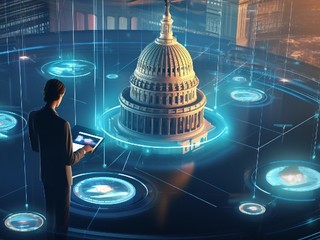 The Biden administration has made regulation around artificial intelligence a priority, including guidelines to federal agencies buying AI, as well as an Executive Order on the Safe, Secure, and Trustworthy Development and Use of Artificial Intelligence, guidelines for agencies when it comes to buying AI, and a taskforce to combat deepfakes.
The Biden administration has made regulation around artificial intelligence a priority, including guidelines to federal agencies buying AI, as well as an Executive Order on the Safe, Secure, and Trustworthy Development and Use of Artificial Intelligence, guidelines for agencies when it comes to buying AI, and a taskforce to combat deepfakes.
The incoming Trump administration plans to continue making AI a priority going forward, and is considering naming a so-called “AI czar” in the White House to coordinate federal policy and governmental use of the technology, according to a report from Axios, which cited unnamed Trump transition sources.
While the most likely candidate for the position would be Elon Musk, who emerged as one of the most high profile Trump backers during the campaign, and who has been tasked with running the newly formed Department of Government Efficiency (DOGE), alongside Vivek Ramaswamy, the report says that he will not be named to the role. However, he and Ramaswamy are said to have “significant input” into who will be chosen.
In addition to an AI czar, the transition has also vetted cryptocurrency executives for a role as White House crypto czar, and there is now talk that the two roles may be combined under a single emerging-tech czar.
As for what the AI czar would actually do, according to Axios they would focus on both public and private resources to keep America in the AI forefront. That would mean likely working with agency chief AI officers, which were established in President Biden’s AI executive order, as well as with DOGE to use AI to find waste, fraud, and abuse.
During the campaign, Trump mentioned artificial intelligence a number of times, including on a podcast with Logan Paul, in which he described AI as a “superpower” that writes “beautifully.” At the same time, also called its capabilities “alarming,” specifically mentioning deepfakes, which are videos or audio of a person, in which their face, voice, or body has been digitally altered so that they appear to be someone else.
Trump also noted that the US is in competition with China for supremacy with AI technology, and his belief that environmentalists’ concerns over energy use could cause America to lose ground.
As president-elect, Trump also vowed to repeal the Biden executive order on AI.
There are a lot of details still to be worked out, and while such a position is important when it comes to America’s long-term leadership when it comes to artificial intelligence, the most important thing will be who gets picked for the role, said Alon Yamin, co-founder and CEO of Copyleaks, a cloud platform focused on detection of plagiarism, copyright infringement, and content leaks using advance AI technology.
“Appointing a U.S. AI czar could be pivotal in ensuring artificial intelligence is developed and deployed responsibly. This leader would unify fragmented efforts across federal agencies, champion ethical standards, and establish a regulatory framework that balances innovation with public safety. Such a position could bolster the U.S.’s global leadership in AI by fostering international collaboration and tackling critical issues like algorithmic bias, data privacy, and workforce disruption,” he told VatorNews.
“However, the impact hinges on who fills this role. We must scrutinize their motivations, potential biases, and whether their decisions truly support equitable innovation or disproportionately favor large corporations over small businesses. Ultimately, the success of this initiative will depend on the strength and fairness of the regulations—or lack thereof—implemented by the federal government.”
(Image source: axios.com)




















